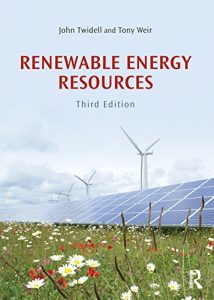Renewable Energy Resources is a numerate and quantitative text covering the full range of renewable energy technologies and their implementation worldwide. Energy supplies from renewables (such as from biofuels, solar heat, photovoltaics, wind, hydro, wave, tidal, geothermal, and ocean-thermal) are essential components of every nation’s energy strategy, not least because of concerns for the local and global environment, for energy security and for sustainability. Thus in the years between the first and this third edition, most renewable energy technologies have grown from fledgling impact to significant importance because they make good sense, good policy and good business.
This Third Edition is extensively updated in light of these developments, while maintaining the book’s emphasis on fundamentals, complemented by analysis of applications. Renewable energy helps secure national resources, mitigates pollution and climate change, and provides cost effective services. These benefits are analysed and illustrated with case studies and worked examples. The book recognises the importance of cost effectiveness and efficiency of end-use. Each chapter begins with fundamental scientific theory, and then considers applications, environmental impact and socio-economic aspects before concluding with Quick Questions for self-revision and Set Problems. The book includes Reviews of basic theory underlying renewable energy technologies, such as electrical power, fluid dynamics, heat transfer and solid-state physics. Common symbols and cross-referencing apply throughout; essential data are tabulated in appendices.
An associated eResource provides supplementary material on particular topics, plus a solutions guide to Set Problems.
Renewable Energy Resources supports multi-disciplinary master degrees in science and engineering, and specialist modules in first degrees. Practising scientists and engineers who have not had a comprehensive training in renewable energy will find it a useful introductory text and a reference book.






